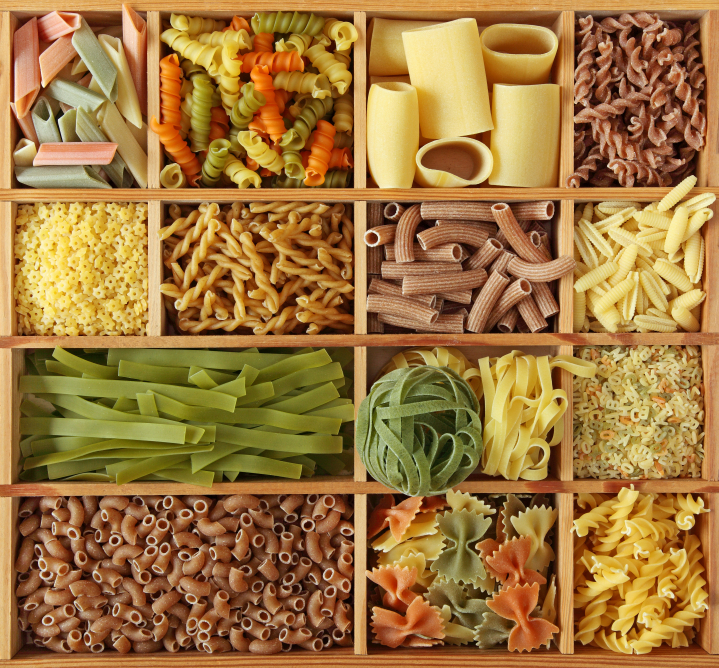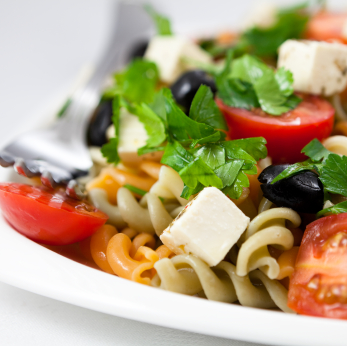Share This
“Crazed Dog Terrorizes Neighborhood” says the headline, but when you read the story you learn that one small puppy nipped a child who pulled its tail too hard. “Mayor Caught with Pot” reads a “clever” caption, but the photo simply shows Hizzoner carrying a chicken casserole on his way to a potluck dinner.
We’ve all been fooled by misleading headlines, and several similar ones that resonated throughout the food world this week were no exception. “Pasta Linked to Depression in New Study” said ABC News, while CBS in New York City led with “Study: Too Much Pasta Can Lead to Depression.” Really? Oldways decided to check out the facts, by reading the actual study.
In this study, published in the journal Brain, Behavior and Immunity, researchers at the Harvard School of Public Health led by Dr. Michel Lucas followed the health of more than 43,000 women, quizzing them every two years on their eating habits. After twelve years, the scientists checked blood samples for inflammation markers, then compared the women’s diets, their inflammation levels, and whether they had been diagnosed with depression. They concluded that an “inflammatory diet pattern” was associated with greater likelihood of depression.
In the study, certain food groups were associated with an inflammatory diet pattern Foods that trigger inflammation were: sugar-sweetened soft drinks, refined grains, red meat, margarine, and diet soft drinks. Those that restrain inflammation were wine, coffee, olive oil, and green leafy and yellow vegetables. Deep in the footnotes, the scientists said that the refined grain group included “white bread, English muffins, bagels or rolls, muffins or biscuits, white rice, pasta, pancakes or waffles, cold breakfast cereals.” So why was pasta in all the headlines? Why not “Pancakes Linked with Depression” or “Sure Enough, Those Huge Bagels Are Trouble?”
Pasta doesn’t deserve the bad rap, and once again Oldways feels it’s important to help pasta fight back. While the study speculates that high consumption of refined grains raises inflammation through increased glycemic impact – spiking our blood sugar – it neglects to state that the glycemic impact of pasta is very different from all the other foods included in the refined grain group.
The scientific evidence for the “pasta advantage” is large. Here are just a few studies:
- Pasta has a lower glycemic effect than couscous although it has similar composition.
- Glycemic response consistently lower after pasta meal than 3 other takeaway meals.
- Eating pasta at one meal lowers blood glucose and insulin responses at next meal.
- Glucose response lower after spaghetti than after white or wholemeal bread.
- Better cognitive performance in seniors, after pasta meal.
But what about inflammation? Two intervention studies specifically show that pasta reduces inflammation compared to other grain foods.
An Australian study, for instance, tested inflammation markers in a group of young men after they had eaten three separate meals, each including 50 grams of a different carbohydrate (glucose, white bread, or pasta). After the glucose and bread meals, inflammation markers were three times higher than after the pasta meal.
In a second study, conducted in Finland, 47 individuals with metabolic syndrome were assigned randomly to one of two diets for 12 weeks. The first included oats and wheat bread, and the second diet included rye bread and pasta. Those eating the rye bread and pasta diet, which was designed to have a lower glycemic impact, had lower inflammation markers in their blood after the study.
These two studies, although small, were intervention studies, showing cause and effect with pasta resulting in lower inflammation, while the Harvard study is what’s called an “epidemiological study” which shows an association (not cause and effect) between a wide range of unspecified refined grains and inflammation. (And remember, it could be that the women with the most inflammation ate stacks of pancakes dripping with syrup every day but never touched pasta – all we know is that they’re in the “high refined grains” group.)
We understand and agree that diet has a strong impact on health, and that increased consumption of soda, red meat and refined grains is linked to
increased inflammation levels in the body. But pasta – because of the way that extrusion compacts its molecules – doesn’t spike blood sugar. When eaten as part of a healthy pasta meal, with other known anti-inflammatory foods like extra-virgin olive oil and leafy greens, pasta becomes even more of an inflammation fighter. Switch to whole grain pasta instead of refined, and you can kick the health benefits up one more notch, adding extra vitamins, minerals and fiber to the low-glycemic advantages of pasta.
It turns out that even the study’s lead author, Michel Lucas, decries the way his research was distorted. In an interview with examiner.com titled “ ‘Pasta and depression’ study author: I never said pasta causes depression,” Dr. Lucas said that the press has grossly oversimplified and “exaggerated his research to suggest that eating pasta causes depression” but that the thrust of his study is the effects of an overall inflammatory diet.
To help Dr. Lucas clarify matters, Oldways contacted him and asked for his comments. In an email to us, he called the misleading reporting “a big mess” and said he has been working to correct the oversimplification in many subsequent interviews. He also indicated that “whole grain pasta [is] part of a healthy diet”. Kudos to Dr. Lucas for carrying out this important study – and big disses to the journalists who contribute to consumer confusion by sensationalizing nutrition news.



Comments
Add a Comment